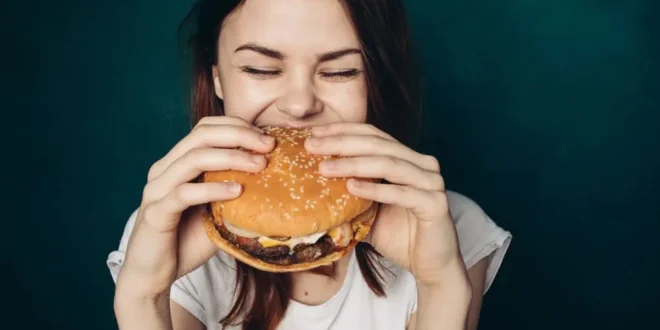1. Refined carbohydrates

Refined carbohydrates, such as white bread and pasta, are made from wheat that has been processed to remove the wheat germ. This wheat germ is responsible for the natural color and nutrients found in whole grain products like brown bread and pasta.
Foods and beverages high in sugar also fall under the category of refined carbohydrates. Once consumed, these foods are rapidly broken down into simple sugars by the digestive system, leading to a high Glycemic Index (GI). High GI foods cause a rapid spike in blood sugar levels, and any excess sugar that the body doesn’t immediately use for energy is stored as fat.
It’s generally advised to limit or avoid these foods, especially before bedtime, as the body has less opportunity to burn them off. Consuming them at night can contribute to weight gain and an increase in body fat percentage.
Summary:
Refined carbohydrates have a high GI and quickly convert to simple sugars, which flood the bloodstream. Some of this sugar is used for energy, but the excess is stored as fat, potentially leading to weight gain.
2. Chocolate

Few people can resist the temptation of a rich, velvety chocolate bar. However, much like sugary sodas, sweet treats can interfere with our sleep cycles and contribute to long-term health issues—particularly when consumed right before going to bed.
Chocolate also naturally contains caffeine, which can disrupt our ability to fall asleep and stay asleep. As a result, we may wake up feeling groggy, fatigued, and lacking energy. Typically, the higher the cocoa content, the more caffeine the chocolate is likely to have.
But that’s not all—chocolate includes another stimulant called theobromine, which is partly responsible for the mood-lifting sensation we get when we eat it. Unfortunately, this same compound can keep us awake at night, especially for those who are sensitive to stimulants like caffeine.
Summary:
Chocolate is high in sugar, which can contribute to weight gain if not balanced with activity, and it also contains caffeine and theobromine—both of which can act as stimulants that negatively affect sleep.
3. Spicy foods

Spicy dishes like curry and chilli can interfere with our sleep for a number of reasons. One of the main issues is that they can trigger indigestion and acid reflux, causing enough discomfort to make falling asleep difficult.
Moreover, consuming a heavy, spicy meal late in the evening and then lying down before it’s fully digested can allow stomach acid to move upward into the esophagus. This can result in heartburn, which further disrupts restful sleep.
In addition, spicy foods tend to raise body temperature temporarily. Since cooler body temperatures are more conducive to deep sleep, this increase can make it harder to drift off or stay asleep. For all these reasons, it’s advisable to enjoy spicy meals earlier in the evening to minimize their impact on sleep quality.
Summary:
Spicy foods may cause indigestion, acid reflux, and heartburn, and they can raise body temperature—all of which can disturb sleep.
4. Coffee

Research has shown that drinking caffeine even six hours before bedtime can cut sleep duration by up to an hour. This leads to fatigue the following day, prompting us to reach for more coffee, and thus the cycle of poor sleep and overconsumption continues.
Summary:
Coffee’s high caffeine content makes it a strong stimulant that boosts energy, but drinking too much or too late can keep the brain alert into the night, disrupting sleep and perpetuating a cycle of tiredness.
5. Salty snacks

Summary:
Salty foods eaten in the evening may disrupt sleep, with research showing they can interfere with REM sleep and cause up to several hours of nighttime disturbance.
6. Greasy foods

Research into sleep and diet has shown that consuming high-fat dinners increases nighttime awakenings and reduces the amount of time spent in REM sleep—the critical stage linked to dreaming and mental recovery. Additionally, these heavy meals can disrupt breathing and contribute to acid reflux, both of which further interfere with restful sleep.
Summary:
Greasy, high-fat foods eaten in the evening are linked to disrupted sleep. Studies indicate that people who consume more dietary fat tend to experience more broken and less restorative sleep than those on lower-fat diets.
7. Ice cream

Summary:
Rich, sugary, and fatty desserts like ice cream are hard to digest and can interfere with both sleep quality and duration when eaten in the evening.
8. Diuretic foods

Diuretic foods—those with high water content—can increase the need to urinate, especially if consumed in the hours leading up to bedtime. This can lead to multiple nighttime trips to the bathroom, interrupting your sleep and reducing its overall quality.
Examples of natural diuretics include cucumbers, celery, watermelon, asparagus, beets, cranberries, and citrus fruits. While these are all low in calories and packed with essential nutrients, making them excellent choices for a healthy diet, timing matters when it comes to sleep.
If you notice frequent nighttime urination, consider shifting these foods to earlier in the day—lunchtime is ideal. The same advice applies to water intake: try to drink the bulk of your daily hydration needs before 8 p.m. to avoid disrupting your rest.
Summary:
Foods like watermelon, celery, and cucumber act as natural diuretics, increasing urination. To avoid sleep disturbances, it’s best to consume them earlier in the day rather than in the evening.
9. Alcohol

After a demanding, stressful day, it’s easy to reach for a glass of wine—or maybe even a second—to unwind. It may feel like the perfect way to relax, and as soon as your head hits the pillow, you might drift off almost instantly. Sounds like the ideal sleep aid, right? Not quite.
Although alcohol can make you feel calm and drowsy, it actually triggers the release of cortisol—a hormone associated with stress. While you may feel relaxed on the outside, your body is experiencing heightened internal stress. Prolonged elevated cortisol levels have been linked to inflammation, weight gain, and increased risk of chronic conditions such as type 2 diabetes and heart disease.
Moreover, while alcohol may help you fall asleep faster, it significantly reduces your time spent in REM sleep—the critical stage responsible for mental restoration and dreaming. As a result, you may wake feeling groggy, unfocused, and unrested.
Summary:
Alcohol can make us fall asleep faster, but it disrupts REM sleep and raises cortisol levels, which may contribute to long-term health issues like weight gain and chronic disease.
10. Fizzy drinks

Fizzy drinks like sodas and colas are loaded with sugar, and consuming them in the evening—when we’re winding down and less active—can contribute to unwanted weight gain. Many of these beverages, particularly colas, also contain caffeine, a stimulant known for keeping us alert and awake, which is far from ideal before bedtime.
Research has found a link between poor sleep and the consumption of sugary, caffeinated drinks. Individuals who sleep fewer than five hours a night are significantly more likely to consume these beverages than those who regularly get the recommended seven to eight hours. Beyond just disturbing our sleep, these drinks may also raise the risk of developing chronic conditions such as type 2 diabetes and heart disease.
Summary:
Caffeinated, sugar-laden drinks can delay sleep, reduce overall sleep quality, and increase nighttime awakenings, while also contributing to long-term health risks—making them poor choices for evening consumption.


